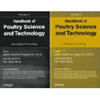National Chicken Council urges passage of Trade Promotion Authority
Trade Promotion Authority (TPA) legislation must receive prompt passage so that the position of U.S. international trade negotiators is strengthened as they continue to move forward with new agreements, the National Chicken Council (NCC) said.
"NCC supports the move toward improved free and fair international trade," said NCC President Mike Brown, on the heels of the next round of Trans Pacific Partnership (TPP) negotiations and congressional testimony this week delivered by Ambassador Michael Froman. "With 20 percent of our production being exported to more than 100 countries, outside-the-border customers are becoming more and more important, especially for our dark meat parts."
Chicken meat and paw exports accounted for approximately $5 billion in 2014.
Congressional approval of TPA is necessary to ensure a more successful outcome for the ongoing negotiations for TPP and the Transatlantic Trade and Investment Partnership (T-TIP). "It is necessary to have TPA enacted because it will be essentially impossible to gain Congressional trade pact approval otherwise," Brown noted.
TPA legislation provides for an up or down vote in the House and Senate without the opportunity to provide amendments or make changes in the agreements. The previous authority expired in 2007 and this vacuum has given negotiators on the other side of the table an unnecessary excuse to drag their feet toward reaching a final, beneficial deal.
As Ambassador Froman told the U.S. Conference of Mayors the day after the State of the Union address, "America has always been strongest when it speaks with one voice, and that's exactly what Trade Promotion Authority helps us do."
At one time, Russia and China were the United States' two largest poultry export markets, but these two markets have been severely disrupted with trade curtailed from previous levels. "It is now more important than ever to expand poultry sales to other world markets," Brown continued.
In regards to TPP, Brown said the chicken industry hopes to see that the long-protected Canadian market is finally opened to trade. "In our view, the Canadian market should have been opened to free trade as a result of NAFTA. If TPP is truly a free trade agreement, then there should be free trade in poultry between the United States and Canada, not just one-way market access for Canada.
"We are frankly, less optimistic about the prospects for chicken under T-TIP," Brown said. "The ban currently imposed by EU regulations on importation of our chicken is not based on sound science and is inconsistent with WTO rules. T-TIP would only be of use to our industry if the negotiations resulted in the removal of these SPS barriers that Europe has had in place for nearly 18 years.
"Our support is limited to TPA at this point so that our government can resolve these issues with Canada and Europe prior to our being able to support the two individual deals."
TPP, if successfully concluded for U.S. poultry, will expand U.S. chicken exports by at least $500 million annually and possibly more, if restrictive market access measures and sanitary/veterinary issues and other non-tariff trade barriers can be addressed. If the EU drops its unscientific trade barriers on our chicken, T-TIP could benefit U.S. poultry exports by more than $600 million annually.
"Passage of TPA would help ensure these increases, generate more farm income, jobs in rural districts, and improve the U.S. trade balance," Brown concluded.
Source: NCC
Looking for a reprint of this article?
From high-res PDFs to custom plaques, order your copy today!




